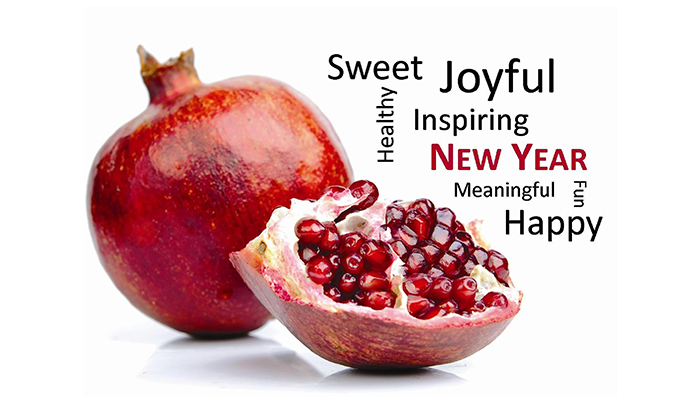Dateline Jerusalem — How do you observe New Year’s? Go to all-night parties? Drink bubbling champagne? Watch a glittering ball drop from high at midnight in Times Square? Attend headline entertainment? Or make your own entertainment with noisemakers and/or fireworks? Not me.
I spend two long days and evenings in synagogue in prayer, reflecting and repenting, listening to the beautiful trumpet-like sounds of the shofar (or ram’s horn), a wake-up call for us to remember G-d. Then I get together with family and friends at festive meals with symbolic foods. But my New Year’s is the Jewish New Year holiday of Rosh Hashana in 2½ weeks.
Rosh Hashana, according to the Talmud, is the anniversary of the birth of mankind, the creation of Adam and Eve. The coming New Year will be the year 5777, by the Hebrew calendar. For it will be 5777 years from the day of creation of man. The world was created on the first day and. Man was created on the sixth day. On the seventh day G-d rested after having created a perfect world.
Rosh Hashana, literally “head of the year,” is also known as the Day of Judgment when G-d judges last year’s deeds and decides our fate for the coming year. We try our utmost to repent for our transgressions and pray for a favorable decree. It is a time when it will be decided who will be at peace and who will be at war, who will live and who will die, and who will be rich and who will be poor. We give charity and perform acts of kindness to overcome and cleanse ourselves from our transgressions and sins, whether they be intentional or unintentional. For only prayer, repentance and charity can remove a bad decree.
Asking Forgiveness of All
Not only do we ask forgiveness for our sins related to G-d, but also forgiveness from both friends and enemies for any intentional and unintentional transgressions we may have committed against our fellow man. Our requests for forgiveness must be sincere. Just saying “I am sorry” wastes words if one does not mean them. If, after showing true regret for our actions, words, and deeds, we are not forgiven, we must ask again, up to three times. Only then will we no longer be held accountable for the transgression. The transgression will be transferred from us to the person who holds the grudge and refuses to accept our true and sincere apology.
Therefore, if I have said or done anything that has caused any of you distress or pain, or injured you in any way, whether by action or deed, or inaction, or in any way at all, please forgive me. I am often unaware of my transgressions as many times they are unintentional. To reach all who may have been hurt by me, I send out this request for forgiveness en masse. Although it is not expressed individually, but is sent out to family, friends, and readers of my essays en masse, please believe it is truly sincere.
Throughout Israel it is the custom for strangers to greet each other with “Chag Sameach” or “Happy Holiday,” “Shana Tovah” or “Good Year,” and say the phrase “You should have a good and sweet new year.” It is also customary to eat symbolic foods, avoiding others. For example, we avoid pickled foods to ward off a sour year. Some do not eat walnuts because the Hebrew word for it has the same numerical value as the Hebrew word for sin.
We dip apples which symbolize the Garden of Eden at the time of Creation, and round challahs, which symbolize the cyclical nature of the year and the continuity of Creation, in honey for a sweet year ahead. Raisins sometimes are added to the challah for sweetness and to dishes to commit to “raisin’” our hopes and expectations for the new year. Raisins eaten with celery are for a “raise in salary”. We eat pomegranates because allegedly they have 613 seeds, each one coinciding with the 613 commandments in the Torah. Jews have more than just 10 Commandments. We make a blessing that our good deeds this year will be as plentiful as the seeds of the pomegranate.
Strong Symbolism
Because Rosh Hashana means head of the year, a fish head or that of a lamb is often displayed on the table so that G-d shall place you as a “head” and not as a “tail.” A fish symbolizes fertility and abundance. Some Jews have the tradition of saying pun blessings over certain symbolic foods. In Israel most puns are in Hebrew, but some are in Yiddish. Carrots symbolize increased good deeds because the Yiddish word means “more,” and sliced carrots in small rounds that look like coins are served with a blessing for prosperity. Beets symbolize banishing enemies as they are eaten with a wish that all enemies who might “beat” us will leave us alone, or that “we will beat any obstacles that come our way.” Peas are for more “peace” and lettuce is for “Let us find happiness in the new year”.
My blessing to all of you is that G-d inscribe you and your loved ones in the Book of Life for a long life and a year of health, happiness, prosperity, tranquility, peace, and safety. May you all have a good, sweet, and favorable new year.
“Kesiva V’Chasima tova”— May you be inscribed and signed for life.
L’hitraot. Shachar

